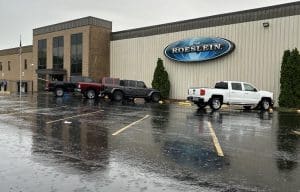WHS Legacy Society selects distinguished honorees
The Waterloo High School Legacy Society will honor five five distinguished graduates on the Legacy Wall with an open house and reception to take place Thursday, Oct. 8, from 6:30 to 8 p.m. in the WHS courtyard or foyer, depending on the weather.
The latest crop of honorees includes the late Dr. Roy Bickelhaupt (Class of 1945), along with Harry Wolf (Class of 1948), Dr. Bruce Walz (Class of 1958), Dan Nobbe (Class of 1985) and Mark Munsell (Class of 1986).
The WHS Legacy Society is continuing its mission to honor the past and showcase the school’s rich history for present and future generations by selecting five individuals to honor every six months.
Legacy Society founder Kelly Lerch said graduates are nominated by the community and voted upon by the society.
Dr. Roy BickelhauptBickelhaupt, who died in 2013, graduated third in his class in 1945 and was a baseball and basketball standout while at WHS. He pitched in the Chicago Cubs minor league system and even threw batting practices for the St. Louis Browns.
He earned a bachelor’s degree from University of Illinois, a master’s degree in metallurgical engineering from Rensselaer Polytechnic Institute and a doctorate in ceramic engineering from U of I. He served as head of the materials science section at Southern Research Institute in Birmingham, Ala., from 1963 to 1984, and was owner and president of Bickelhaupt Associates until 1988.
Bickelhaupt was an assistant professor of ceramic engineering at U of I and a professor of ceramic engineering at Clemson University. In 1992, Bickelhaupt was named to the U of I President’s Council, the university’s highest donor recognition.
He published 30 papers over the course of his career and had several patents in fly ash resistivity to control power plant emissions.
Harry WolfWolf is well-known for leading the Waterloo German Band. Wolf was just 9 when he joined the Monroe County Farm Bureau Band as a cornetist. When the band folded during World War II, Wolf’s mother purchased a set of band books.
Wolf, Bill Schmidt, Otto Bassler, Jim Heyl and Nelson Wolf used the books to start their own band, “The Hungry Five.” The boys played for free and sometimes played for food. When the boys reached legal drinking age, they changed the band name to “The Thirsty Five.”
Wolf, who switched from cornet to tuba when he was a sophomore in high school, continue to play with the band, which became known as the Waterloo German Band in 1945.
After serving four years in the U.S. Marine Corps, Wolf attended Pennsylvania State Teachers College, an institution he chose because of the German community nearby. Wolf graduated in 1958 with a bachelor’s degree in education. Wolf taught German for 20 years at the junior high level, retiring in 1990.
Wolf’s love of German culture and passion for keeping German heritage alive resulted in him being the 2010 recipient of the Bundesverdienstkreuz (Federal Cross of Merit) by the German government. This award is the highest honor an American can receive from Germany.
Dr. Bruce WalzWalz participated in band and served as vice president of the WHS Class of 1958. He earned a full scholarship to Washington University, where he completed undergraduate and medical degrees.
During the Vietnam War, Walz was a medical officer on the USS Bainbridge, a nuclear-powered frigate, and made one combat cruise to Vietnam. He was honorably discharged with the rank of Lieutenant Commander.
Walz later served as an instructor in radiation therapy at Harvard Medical School, and was an associate professor of clinical radiation at Washington University.
He then entered into private practice as medical director of St. Anthony’s Medical Center in St. Louis County and continued as a cinical associate professor at Washington University, a position he still holds.
He has written for many academic publications and made presentations axeoss the world on subjects including colorectal carcinoma, ovarian carcinoma, and brachytherapy for gynecologic malignancy.
Dan NobbeNobbe played tennis, football, basketball and soccer and was a member of National Honor Society at WHS, where his classmates voted him “most likely to succeed” and “best all around.”
Nobbe earned a bachelor’s degree in electrical engineering from the University of Missouri at Rolla and completed his master’s degree in electrical engineering from the University of Texas at Arlington. He has been pioneering radio frequency solutions for mobile devices, wireless infrastructure and public safety radios since 1989.
In 2000, Nobbe joined Peregrine, opening the company’s Chicago design center and becoming vice president of engineering. His accomplishments include breakthroughs in RF SOI antenna switches and amplifier products. Peregrine has shipped more than 2.5 billion of these devices, mostly in cell phones.
He co-developed a radio chip that is in a NASA mission on its way to Jupiter. Nobbe also held a senior staff position at Motorola, where he was involved in the early development of digital cell phones.
Currently, Nobbe holds 10 patents and has 22 patents pending. He has published and presented more than a dozen technical papers and is currently contributing to research at multiple universities.
Mark MunsellMunsell played football and baseball and also performed in the speech and drama clubs and school choir while at WHS.
Munsell earned a bachelor’s degree in geography from Southeast Missouri State University and began a career in federal service working for the National Oceanic and Atmospheric Administration in Norfolk, Va.
He wrote software to more accurately map oceans and helped improve the accuracy of the world’s measurement systems.
Munsell transferred to Washington, D.C., where he developed the country’s new nautical charting system. This saved the government millions of dollars and he was awarded the NOAA’s Bronze Medal.
Munsell returned to St. Louis to work for the National Geospatial-Intelligence Agency. He designed and built a system that supplies navigation information for the Department of Defense’s aircraft operations. Every aircraft that flies for the military relies on this system to safely navigate around the world.
Munsell formed IMAPS with another WHS graduate, Jim Lewis. They built the online flight planning company ofabout 80 employees in Columbia before selling it to SAIC.
Back at NGA, he assisted the military’s technology initiatives in Iraq and Afghanistan. He was deployed to Baghdad, Iraq, working closely with Iraqi government officials and other foreign coalition forces and state departments to provide intelligence to affect the outcome of the war.
Munsell was promoted and sworn into the Senior Executive Service, the highest rank in civilian service. In 2015, he was awarded the Defense Distinguished Civilian Service Medal for improving the nation’s ability to conduct precision strikes while decreasing collateral damage.
Munsell continues software development and has developed apps for smart phones with more than one million downloads.






